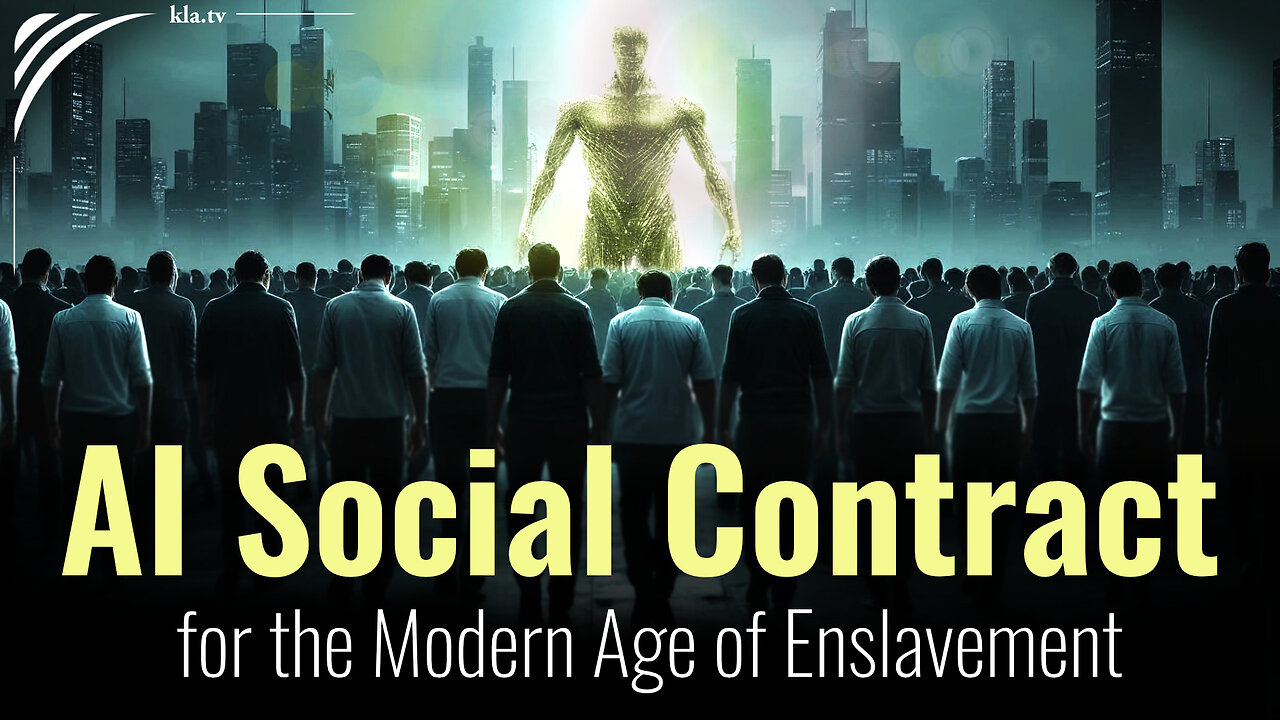Premium Only Content

UN100 Social Contract: The End of our Freedom
Do you know what a social credit or a social credit system is? It is a system of total surveillance in which a government comprehensively spies on its citizens' behavior, awards or deducts points and – depending on the "balance" of the social credit – citizens are given preferential treatment or they are punished. This is well known from China.
In 2018, SRF was still critical in its reporting on the consequences of the Chinese social credit system for citizens. That same year, a member of parliament made a statement at the Chinese party congress: "I call for a broad catalogue of penalties for people with poor social credit. People with this kind of credit should be restricted in their freedom of movement by various means." You can clearly see what this means in practice in the example of the investigative journalist Liu Hu, who was put on a blacklist because of an article that reported about corrupt officials. He is under permanent surveillance, can hardly do his job anymore and can no longer travel by train or fly. Liu Hu: "I can't book hotels anymore, I can't buy an apartment, I can't register a company or be a legal representative of any organization."
In the meantime, things have gone quiet in the mainstream. Various publications were not followed by any great outcry. China is far away. Something like this would be unthinkable in the democratic West. Or maybe not? Almost nobody suspects that concrete plans are already in place to install a worldwide social credit point system. And that's because SRF and other public service media categorically conceal this fact, thus immersing the Western population in a false sense of security. Which plans are we talking about?
In 2019, a group of think tank members, politicians, former heads of government, academics and tech-industry representatives came together and, alongside the Coronavirus-PLAN-demic, set specific goals to transform the entire world. As a kind of working paper, a book emerged from this meeting, entitled "Remaking the world – The Age of Global Enlightenment". The contributors include high-ranking individuals such as EU Commission President Ursula von der Leyen, the so-called "father of the Internet" and Google Vice President Vint Cerf as well as Ramu Damodaran, head of the UN initiative United Nations Academic Impact The book appeared under the label "UN100", which is the same United Nations initiative called into existance for its 100th anniversary celebration in 2045. An influential US think tank; the Boston Global Forum however, had the lead part in this. What is the book about? The authors write that artificial intelligence has the great potential to change our lives. At the same time, they write that the undisciplined use of AI has great potential for abuse.
This is why we need a "Social Contract for the AI Age" [explanation: social contract: an agreement between the members of a society to work together for the good of society], which should apply to the whole world – regardless of the diversity of all countries, ethnicities and cultures.
Kla.TV has analyzed this Social Contract in more detail. The Social Contract for the AI Age – Comprehensive Application of AI From AI Equality to the Digital God? The first chapter of the book shows where this journey is taking us: The Social Contract for the AI age is said to create a platform for a "Smart Democracy society". It is also based on a power-balance between governments, companies, civil society, individuals and AI assistants. Creating such a balance of power is a very lofty goal and would require nothing less than a change in the global system. Because the current political world situation would aptly have to be described as an imbalance of power where secret clubs and...https://www.kla.tv/37888
-
 LIVE
LIVE
BlankChip
6 hours agoARC RAIDERS MAX RANK PUSH TO 75!
29 watching -
 1:02:56
1:02:56
BonginoReport
3 hours agoTrump IS The Comedian in Chief - Nightly Scroll w/ Hayley Caronia (Ep.180)
125K38 -
 LIVE
LIVE
IdeaJunky
1 hour agoHollow Knight
21 watching -
 1:30:06
1:30:06
Kim Iversen
4 hours agoMarjorie Taylor Green Calls Trump A Traitor | Epstein's Brother Says They're SCRUBBING Files Of GOP Names
79.3K138 -
 LIVE
LIVE
Jorba4
2 hours ago🔴Live-Jorba4- Arc Raiders - Expedition grind
27 watching -
 LIVE
LIVE
Kst0ne13
44 minutes agoCHAT DECIDES! Kill or don't kill 👀
16 watching -
 8:19:02
8:19:02
Dr Disrespect
10 hours ago🔴LIVE - DR DISRESPECT - ARC RAIDERS - NO MERCY TO MAX LEVEL
122K11 -
 15:38
15:38
T-SPLY
4 hours agoDemocrat Lawmakers Publish Video Asking Troops To Defy "Unlawful" Orders!
10.5K14 -
 25:08
25:08
Brad Owen Poker
11 hours ago $0.03 earnedI Have The Nuts & Player Lies About His Hand! $10,000+ 5-bet ALL IN! MASSIVE Pots! Poker Vlog Ep 357
28 -
 52:17
52:17
CharLee Simons presents DO NOT TALK
11 hours agoCALIFORNIA! PAY ATTENTION!
54